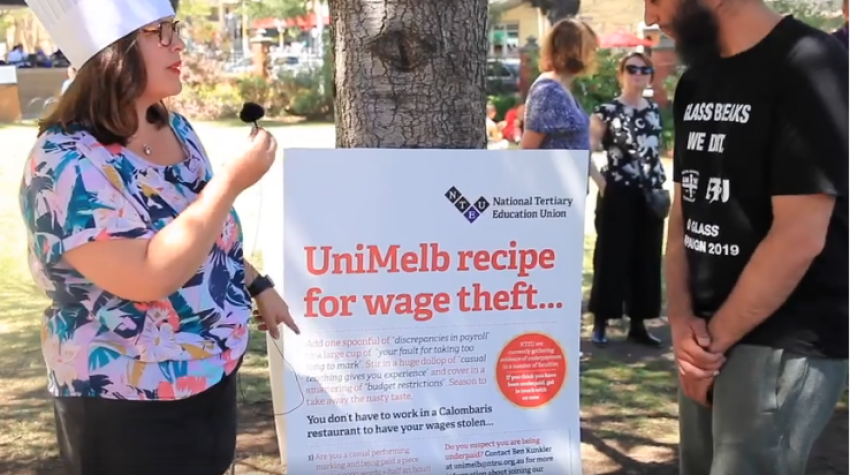
The University of Melbourne has enjoyed a reputation of being the highest-ranked tertiary institution in Australia. Now, it has been exposed as being among the top tertiary educational institutions for wage theft.
The ABC revealed on August 5, that millions of dollars had to be repaid to at least 1500 academics at the university. The National Tertiary Education Union (NTEU) said university management had classified tutorials as “practice classes” to avoid paying staff the full rate.
Wages from University of Melbourne workers are estimated to have been reduced by about one third. According to the university’s latest annual report, it has $4.43 billion in reserves.
Part of the issue is centered on pay rates that Faculty of Arts tutors — mostly casuals — receive for marking student assessments. Rather than paying tutors for the actual time it takes to mark assessments, the university insisted on “piece rates”, providing an arbitrary and wholly inadequate rate for a certain number of words per hour. This, of course, ignores the time workers actually spend on assessing students’ work.
Not only does this high rate of words per hour underestimate the capabilities of tutors, the entire system of piece-rate marking is illegal under both the Higher Education Industry Award and the University of Melbourne Enterprise Agreement.
In effect, tutors were being allocated three minutes for each assessment. The NTEU said on August 5 that tutors at faculties including Arts, Fine Arts and Music, Science and Engineering had been underpaid. It said the University has admitted liability and that back pay claims go as far back as six years.
Some 73% of the University of Melbourne workforce is employed on a casual or fixed-term basis.
The University of Melbourne Student Union (UMSU) Education (Public Affairs) Officer Charlie Joyce told Green Left this has had a flow-on effect to the quality of education students receive.
He said that there was no doubt that staff working conditions had an impact on students’ learning. “When tutors or lecturers don’t have enough money to pay the bills, they naturally won’t be able to put as much work into supporting their students as they could otherwise”, he said. Casual academics have long campaigned against marking payments.
Wage theft is not unique to Melbourne University. The administration at the Royal Melbourne Institute of Technology has attempted to pay those marking extended responses, such as essays, a substantially lower rate than the rate meant for multiple-choice questions.
Classifying tutorials as “practice classes” or “information sessions” to reduce wages has also been found at Macquarie University in Sydney, the University of Western Australia (UWA) and University of New South Wales (UNSW).
The NTEU said that such a classification attracted a rate of pay between one-half and two-thirds lower than the proper rate. Despite first agreeing to audit this practice, UWA management it is now claiming legal professional privilege. UNSW is conducting a wage theft audit after an NTEU survey of casual academic staff revealed concerns regarding the payment of wages.
Wage theft as a business model is common in fast food, retail and hospitality, with the scale of the underpayment often not noted due to the poverty-level wages of many workers in these industries.
In the comparatively higher paid university sector, wage theft adds up: around $6 million is estimated to have been stolen from workers at the University of Melbourne. This is a substantial sum for casual tutors, who are often struggling on wages as low as $10,000 per annum.
NTEU National President Dr Alison Barnes said on August 5 that casual and insecure employment, which is “rife at Australian universities”, is a key driver of wage theft. “Approximately seven in 10 university workers are insecurely employed, creating a fertile environment for exploitation.”
While university workers have been denied access to JobKeeper payments during the coronavirus pandemic, and the sector has long been underfunded by the federal government, the NTEU is calling for tougher penalties, including criminal ones, for university administrations who steal from their workers.
“Unions need far better access to records, including for former employees and non-members. And we need the right to inspect those records quickly, without having to wait 24 hours”, Barnes said.
“Australian universities should also be compelled to report accurate figures on casual and limited contract employment. This would provide a much clearer picture of which university employees are likely to be exploited.”
While wage theft legislation will take effect in Victoria in less than a year, it is clear that only strong union and student activism can defeat this scourge upon the workplace.
[Leo Crnogorcevic is a Socialist Alliance member, Monash University student and former NTEU University of Melbourne branch intern.]